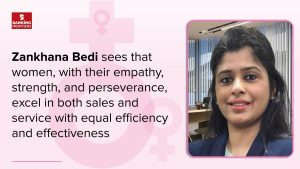

DBS Bank India and CRISIL partnered to study the financial preferences of the urban Indian woman – salaried and self-employed, across 10 major cities. They reached out to 500 women for face-to-face quantitative interviews and additional 300 women through focussed group discussions to assess qualitative insights. The age distribution was 25-35 years: 48%, 36-45 years: 39% and >45 years: 13%. The income distribution was Rs10-25 lakh: 38% (semi-affluent), Rs26-40 lakh (emerging affluent) and Rs41-55 lakh (affluent). The marital status distribution was unmarried without dependents: 11%, unmarried with dependents: 7%, married without dependents: 25%, married with dependents: 57%. There was a 50:50 mix of salaried and self-employed.
Key Insights
1. Age, income, marital status, presence of dependents and geographic location are key parameters that influence financial behaviour of women in India.
2. 7% of women take financial decisions on their own, reflecting the momentum in financial independence. 65% of women aged over 45 years take financial decisions independently compared with 41% aged 25-35 years.



 3. Working women in India tend to be risk-averse. About 51% of their investments are parked in fixed deposits and savings account, followed by 16% in gold, 15% in mutual funds, 10% in real estate and only 7% in stocks.
3. Working women in India tend to be risk-averse. About 51% of their investments are parked in fixed deposits and savings account, followed by 16% in gold, 15% in mutual funds, 10% in real estate and only 7% in stocks.
4. Women are nearly equally inclined towards using private and public sector banks at an all-India level. But a staggering 95% in Kolkata prefer public sector banks.
5. More than 90% from the affluent class segment are credit card users; Hyderabad and Mumbai show much higher credit card usage compared to pan-India average of 82%.
6. Many women in the South prefer credit cards over personal loans as they are able to avail of EMI facility on the former.
7. India’s urban women are in step with the broader transformation to a cashless economy. Only 14% prefer cash transactions at an all-India level; Kolkata remains an outlier at 43%.
8. Women aged over 45 years display the highest autonomy in decision-making, with 65% independently managing their finances.
9. 58% of affluent women take their own financial decisions, compared with 38% in the semi-affluent category. This disparity can be attributed to affluent women having higher financial literacy and access to resources.
10. The topmost short-term financial goal for women is supporting family members, with 20% prioritizing this. The next important financial goal is funding their own business or establishing a new one; 14% of women prioritize this.
11. 54% of salaried women save more than 30% of their income, while 49% of self-employed set aside a similar proportion. Almost half of both salaried and self-employed women allocate more than 30% of their income for investments. 57% of salaried women lean towards fixed deposits and savings accounts, while 49% of self-employed women make a similar choice.
12. Women who take decisions independently show greater inclination toward risk-averse investment preferences.
13. Half of the salaried women surveyed in India have not taken any loans. Among the other half, 39% have taken home loans and 33% have opted for vehicle loans.
14. More than 90% from the affluent segment are credit card users, against 76% in the semi-affluent segment and an all-India average of 82%.
15. Only 14% of urban women opt for cash transactions. The remaining favour digital, with 29% preferring UPI, 16% mobile banking, 13% credit cards, and 11% net banking.
Contrasts
Chennai vs Coimbatore: Chennai, renowned as an IT hub with an abundance of high-paying jobs and a global work culture, sees 72% of its women confidently making financial decisions. In contrast, Coimbatore, despite its economic growth, has only 31% of its women taking financial decisions independently.
New Delhi vs Gurugram: In the national capital, 65% of women steer their own financial decisions, driven by Delhi’s cosmopolitan culture and myriad opportunities. However, its neighbour, Gurugram, presents a contrasting picture with only 44% of women taking independent financial decisions.
Read more:
The Art of Retaining Top Talent

AU Bank: Footprints of Expansion









